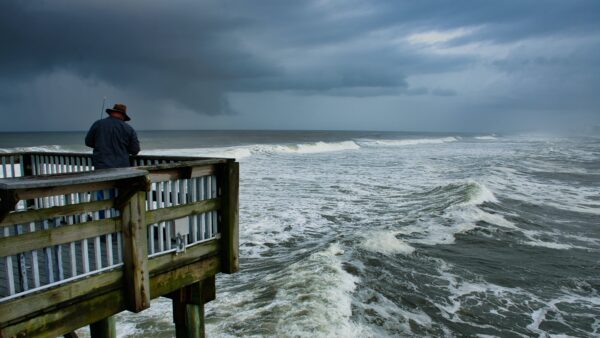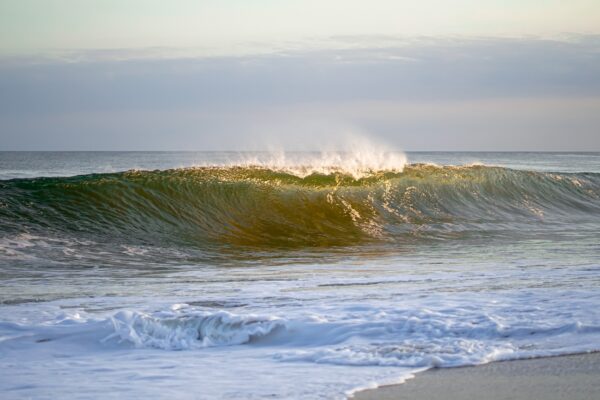Coastal destinations are some of the most popular vacation spots for many reasons. Warm beaches. Surfing. The smell of fresh, salty air. However, there’s one looming risk of planning a vacation next to the ocean: hurricanes. Are you traveling to a hurricane-prone area, especially during hurricane season? Then here’s what you need to know about hurricane travel insurance and how you best prepare for a safe trip–no matter what might happen.
Jump Ahead
 When Is Hurricane Season?
When Is Hurricane Season?
Hurricanes, typhoons, and cyclones are different names for the same weather phenomenon. It’s a tropical storm with violent winds and thunderstorms. A hurricane begins over the ocean and can cause astronomical damage when it reaches shore, such as flooding. The name for this tropical storm will differ depending on where you are in the world. So here’s a quick breakdown for you:
- Hurricanes: Atlantic Ocean and Northeast Pacific Ocean
- Typhoons: Northwest Pacific Ocean
- Cyclones: South Pacific Ocean and Indian Ocean
Additionally, “hurricane season” differs depending on your location in the world. Here’s when you’re most likely to experience a hurricane, typhoon, or cyclone.
- Hurricanes: June to November
- Typhoons: April to December
- Cyclones: November to April
Thankfully, we have such advanced technology to track tropical storms, so you are unlikely to get caught in a hurricane without notice. Even so, you can travel to a hurricane-prone region with peace of mind by taking these extra measures before leaving.
 Is A Hurricane Covered Under Travel Insurance?
Is A Hurricane Covered Under Travel Insurance?
Yes. Most comprehensive travel insurance policies will cover natural disasters like hurricanes. However, you cannot get a travel insurance policy after a hurricane is “named”. This is because a named storm is no longer an “unforeseen circumstance.” That’s why it’s important to purchase hurricane travel insurance as soon as possible after booking your trip, especially if you’re traveling to a hurricane-prone region when hurricanes are most likely to happen.
 Travel Insurance Benefits That Protect You During a Hurricane
Travel Insurance Benefits That Protect You During a Hurricane
When a hurricane disrupts your travel plans, it makes the biggest difference to have the right travel insurance. Here’s a breakdown of essential travel insurance benefits that can help you manage unexpected costs and challenges caused by severe weather events like hurricanes.
Trip Cancellation
If a hurricane forces you to cancel your trip before departure, trip cancellation coverage reimburses you for non-refundable prepaid expenses such as flights, hotels, and tours. This benefit typically applies when the hurricane is officially named after you purchase your policy and affects your destination or departure point, allowing you to recover your trip investment without financial loss. Learn how other natural disasters trigger trip cancellation coverage.
Trip Interruption
In cases where a hurricane cuts your trip short or forces you to return home early, trip interruption coverage reimburses the unused portion of your trip and additional return flight costs to get you home safely. This benefit helps provide coverage for last-minute flights. That way, you’re not left stranded or forking out extra costs due to sudden changes.
Medical Expense Coverage
Hurricanes can lead to injuries or illnesses, especially during evacuations or storm-related accidents. Medical expense coverage pays for emergency medical treatment, hospital stays, surgeries, and prescriptions incurred while traveling. If local healthcare facilities are overwhelmed, medical evacuation coverage could also assist in transporting you to a facility that can better treat you.
Travel Delay
Hurricanes often cause flight cancellations and long delays. Travel delay coverage reimburses expenses such as meals, accommodations, and local transportation if your trip is delayed for a specified number of hours due to a hurricane. This benefit helps cover unexpected costs while you wait out the storm or reschedule your travel.
Missed Connection
If a hurricane disrupts your connecting flights, causing you to miss a scheduled connection, missed connection coverage reimburses additional transportation or lodging expenses incurred to catch up with your original itinerary. This ensures that weather-related disruptions don’t derail your entire travel plan. We’ve written an entire article on missed connection insurance, so check it out if you’re interested in learning more.
 Does Travel Insurance Cover Hurricane Evacuation?
Does Travel Insurance Cover Hurricane Evacuation?
Some policies will include coverage for a non-medical evacuation due to natural disasters. Basically, if the destination country declares a hurricane as an official disaster or the U.S. advises tourists to leave that destination, coverage could apply for a “hurricane evacuation.”
A covered hurricane evacuation would typically transport you to the nearest place of safety or your home, as determined in advance by the sole discretion of the travel insurance company.
“Just make sure you always contact the 24/7 emergency provider included with your policy to coordinate an evacuation, as this is a requirement for coverage,” says Terry Boynton, co-founder and president of Yonder Travel Insurance.
The emergency assistance team will have a better ability to coordinate the evacuation–and in an affordable manner. Usually, the traveler doesn’t pay out of pocket for this when working with the global assistance team. Instead, the travel insurance company would consider it a covered event.
 How To Prepare For Travel During Hurricane Season
How To Prepare For Travel During Hurricane Season
If you do decide to take a trip to a coastal destination during hurricane season, here are some important steps you can take to keep yourself safe, manage the risk, and still have a good time.
 Enroll in STEP
Enroll in STEP
When you enroll in the U.S. Department of State’s Smart Traveler Enrollment Program (STEP), you can opt to receive safety updates on countries you plan to visit, weather-related or not. There are many other helpful resources on this website that can help give you more peace of mind about your future travels.
You can also check the National Hurricane Center website for updates leading up to your trip – they usually name a hurricane 36-48 hours in advance.
 Buy Travel Insurance As Soon As Possible
Buy Travel Insurance As Soon As Possible
Most comprehensive travel insurance policies include cancellation coverage in the event of a natural disaster, like a hurricane. However, you’ll want to purchase your plan as soon as possible. Because once a hurricane is named, it becomes “foreseeable,” and you will no longer be able to purchase a policy with coverage to cancel.
Unfortunately, this is one of the most common travel mistakes made by policyholders. But you can guarantee coverage for non-refundable expenses when you purchase your insurance right after you make your first trip deposit.
Pro Tip: Are you planning a trip to a hurricane-prone area during hurricane season? Don’t wait – you can get an instant quote right now below. To compare hurricane travel insurance policies with the right coverage for trip cancellation, select the filter for “There’s a hurricane or bad weather where I’m going.” (See below)
 Stay Flexible With Your Travel Activities
Stay Flexible With Your Travel Activities
Weather and storms can be unpredictable. Even if the forecast says it will be sunny for your entire trip, you may end up getting caught in the rainy outskirts of a tropical storm. So, make a list of the indoor activities your destination has to offer. From museums to adventure centers to historical sites, you’ll have at least a list of options if you experience an unexpected rainy day.
 Determine The Stability Of Your Destination
Determine The Stability Of Your Destination
Strong hurricane winds and high tidal waves can do major damage to infrastructure, so take some time to consider where you are staying. If your condo is along the beach, moving as inland as possible would be a great option. If flooding is a common hazard at your destination, we recommend staying in a low-risk flood zone. Wooden buildings are highly unstable in a hurricane, so you should relocate to a more secure location. Moving to a shelter is your best bet for staying safe.
 Plan An Emergency Departure
Plan An Emergency Departure
If the worst-case scenario happens, how hard would it be for you to leave the country? It’s important to check out possible transportation options, especially if you’re traveling outside the United States. Plan an alternative exit route in case an unforeseen storm does happen. It’s better than having no plan at all!
- If your vacation is stateside, look at renting a car to drive to a safe zone.
- When traveling in a land-locked country, consider buses that route to a safe zone or a safer neighboring country.
- If your vacation is happening on an island, this can be a bit more tricky, so your options are limited to boat and plane. Just make sure you check the schedules because the routes fill up fast when there’s a storm about to hit.
 Pack Like A Hurricane Might Happen
Pack Like A Hurricane Might Happen
Even if your trip is right around the corner and the weather looks like it’s going to hold, make sure you’re still prepared with what you pack. Pack a small first aid kit, battery-powered flashlight, and non-perishable foods just in case a natural disaster heads your way.
Since ATMs might not be accessible during and after the storm, we recommend you carry enough cash for yourself and family for two weeks. Again, the likelihood you’ll need to use this storm kit is slim, but it’s worth it to have it on hand, just in case.
 Frequently Asked Questions About Hurricane Travel Insurance
Frequently Asked Questions About Hurricane Travel Insurance
Does travel insurance cover cancellations due to hurricanes? Yes, many comprehensive travel insurance policies include trip cancellation coverage if a hurricane forces you to cancel your trip before departure. However, coverage typically applies only if the hurricane is named after you purchase the policy, so it’s important to buy insurance early.
Can I purchase hurricane travel insurance if a storm has already been forecasted? Travel insurance policies require you to buy coverage before a hurricane is officially named. Purchasing insurance after a storm is announced usually excludes hurricane-related claims, so it’s important to secure your policy soon after booking your trip.
What should I do if a hurricane is forecasted during my trip? If a hurricane threatens your destination, contact your travel insurance provider’s 24/7 emergency assistance hotline immediately. They can help coordinate safe evacuation, rebooking, or emergency medical care. Evacuations don’t often require upfront out-of-pocket expenses.
Will travel insurance cover additional costs if my flight is canceled due to a hurricane? Yes, many policies include trip delay and missed connection benefits that reimburse reasonable expenses like meals, accommodations, and alternative transportation when flights are canceled or delayed because of hurricanes.
Are you feeling more prepared to book your vacation during hurricane season? If you’re traveling somewhere prone to cyclones, typhoons, or hurricanes, buying travel protection is wise. It can help you recover non-refundable costs and provide coverage for trip cancellation if you need it.
On the other hand, perhaps you decided traveling in a hurricane-prone region during hurricane season just isn’t worth the risk. That’s completely understandable. If that’s the case, then here are four destinations a hurricane will never hit.
Skylar, a seasoned content writer with over seven years of experience, possesses a deep understanding of the travel and travel insurance industries. Her commitment to authenticity infuses her work with a unique perspective, drawing from three years of dedicated writing in the travel and travel insurance sectors. Skylar's expertise is further enriched by her proactive approach to seeking insights from industry professionals, ensuring that her findings are comprehensive and reliable.



 When Is Hurricane Season?
When Is Hurricane Season?
 Enroll in STEP
Enroll in STEP Buy Travel Insurance As Soon As Possible
Buy Travel Insurance As Soon As Possible
 Stay Flexible With Your Travel Activities
Stay Flexible With Your Travel Activities Determine The Stability Of Your Destination
Determine The Stability Of Your Destination Plan An Emergency Departure
Plan An Emergency Departure Pack Like A Hurricane Might Happen
Pack Like A Hurricane Might Happen










